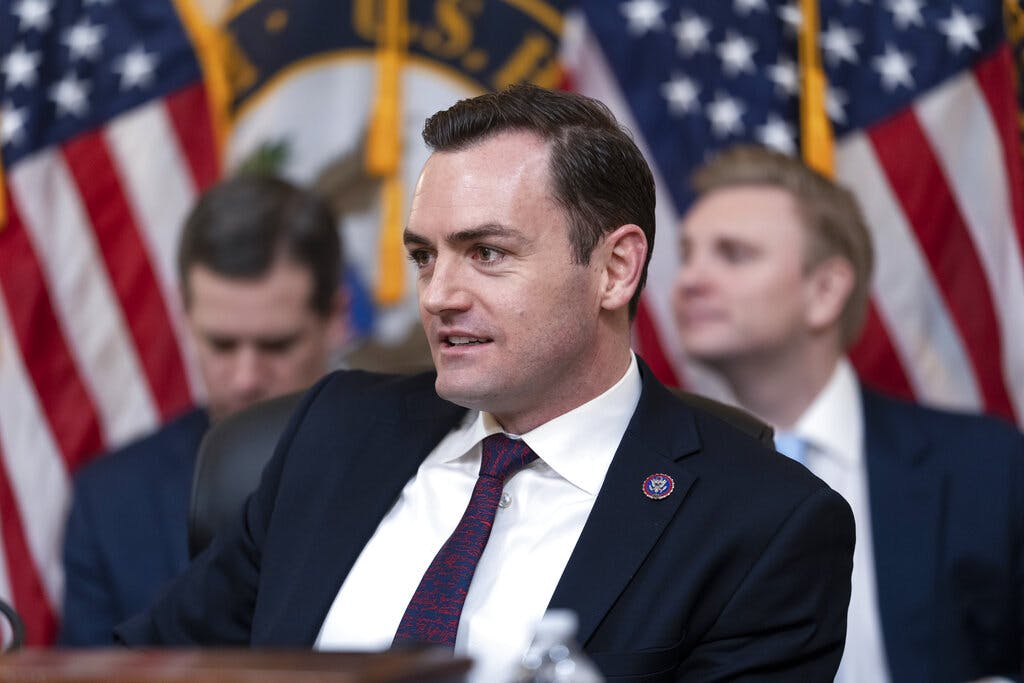Communist China: Unfinished Business
It was President Clinton who spearheaded the drive to deepen trade ties with the Chinese Communists.

How to “decouple” America and Communist China is the focus of the chairman of the new House committee looking into the threat from the Beijing regime. “Everyone made the same basic bet on China,” Congressman Mike Gallagher says. “But it failed. So now we’re trying to extricate ourselves.” Not everyone made the same bet, we’d cavil. But we wish Mr. Gallagher good luck. We think of it as unfinished business, going back to errors of the 1990s.
It was President Clinton, after all, who spearheaded the drive to deepen trade ties with the Chinese Communists, with the goal of bringing Beijing into the World Trade Organization. To achieve that, we had to grant China permanent “most favored nation” trade status — later renamed “permanent normal trade relations.” This was a battle fought out in Congress over the course of the 1990s, with consequences that reverberate today.
The question of trading with Communist China only emerged at all following the economic shift there starting in 1979, when our trade with Beijing was but $2 billion a year. After Tiananmen, Congress sought to limit trade with China unless Beijing improved its human rights record. President George H.W. Bush rejected this approach. After initial criticism of China’s repression, Mr. Clinton came to embrace a similar policy of “constructive engagement.”
Congress appeased, though debate was heated. Democrats like Senator Baucus reckoned our interest lay in avoiding “unnecessary confrontation.” Yet Congressman Frank Wolf, a Republican of Virginia, decried the deepening trade as “not true to American values” and “amoral.” Another Republican, Representative Dana Rohrabacher, said unconditional trade with China was a gift to big American corporations and “an abomination.”
Congressional opposition to China trade quieted over the 1990s, amid what the Congressional Research Service describes as “allegations of illegal Chinese campaign contributions and alleged technology transfers by U.S. aerospace corporations” that prompted the legislators to shift their “primary focus on Chinese actions and policies to a greater scrutiny of decisions and actions” by Mr. Clinton and his administration.
The Wall Street Journal was among the critics raising concerns over “illicit Chinese political contributions” and the possibility of a “quid pro quo” by Mr. Clinton and his camarilla. At the time China was looking for ways to keep its export-fueled economic boom going and eyeing membership in the World Trade Organization. Negotiations ensued with the Clinton White House, which adopted an increasingly friendly posture toward China.
Mr. Clinton, touting closer trade ties with Beijing, allowed that China “does deny citizens fundamental rights of free speech and religious expression.” He could hardly have said otherwise. Yet he insisted the debate was “not whether we approve or disapprove” of China, but “what’s the smartest thing to do to improve these practices?” He reckoned letting Beijing into the WTO would “move China faster and further in the right direction.”
That was a fatal error. We would not want to assign all the blame to Mr. Clinton. It was, though, at the urging of the 42nd president that Congress voted to grant China permanent normal trade relations. “A great day for the United States,” Mr. Clinton kvelled at the signing. He predicted China would “open its markets to American products,” while our companies would “be far more able to sell goods without moving factories or investments there.”
Well, not quite. The terms by which Beijing gained entry to the WTO sparked the “China Shock,” in which America’s industrial heartland was turned into a rust belt and China took the crown as the world’s largest manufacturer. Imports from China soared while trade barriers keep out American goods. Meanwhile, the hopes of Mr. Clinton and others that increased trade would lead to political liberalization proved to be in vain.
Hence, we look forward to the work that begins this evening of Mr. Gallagher’s China Committee. It’s clear the committee is going to concentrate on the future. All the more important to lay down this marker of what happened in the 1990s, when the Democratic idealists gave away the contest by overlooking the defining feature of the Communist regime at Beijing — that it was never a logical partner for America.

